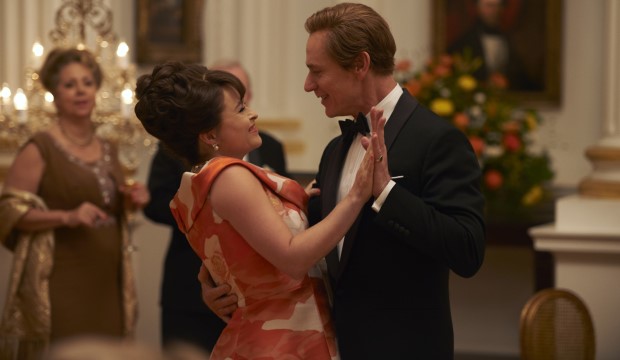
Morgan shows the royals as humans first and images second: they're not the aristocratic angels idealised by fanatics.

Olivia Colman's Queen Elizabeth is sterner and colder
Olivia
Colman’s Queen Elizabeth II, now in her 40s, is sterner and colder than her
previous Claire Foy incarnation – with a stare that can stop time. Her character’s
past naïve hesitation to abide by her duties has mostly dissipated in this later period of 1964 to 1977. This encapsulates the Moon
Landing, the 1966 Aberfan disaster, and the introduction of Camilla Parker Bowles (née
Shand).
But familiar rivalries shine through again with Elizabeth’s frosty relationship with her raucous, fun-loving sister Princess Margaret – played to exuberant, hilarious, and tragic perfection by Helena Bonham Carter. This season covers the latter's dwindling, abusive marriage to Lord Snowdon (Ben Daniels) and culminates in a furiously upsetting final episode.

Princess Margaret (Helena Bonham Carter) with her first husband Tony (Ben Daniels)
Elizabeth’s
less tolerant approach comes at the expense of familial love, especially with
the now grown-up Prince Charles (tenderly portrayed by God’s Own Country
actor Josh O’Connor) who aspires to more creative things. He easily steals the
show; holding a burning frustration with his lack of freedom and his pursuit of love from obviously disappointed parents.
Elizabeth, especially, turns into a bleak picture of passive cruelty when Charles overplays his hand.
On the other hand, Morgan doesn't preach a republican, anti-monarchist message either. This season slowly tries to justify the royal family's existence, with understandable though unconvincing results. The metonymic crown is an undeniably powerful force in the world, notwithstanding the supposed impartiality to anything political, and this season makes that hard to refute.

Prince Charles (Josh O'Connor) at his investiture as Prince of Wales
Season three mostly has the socialist politician Harold Wilson as prime minister, played with nervous, left-wing energy by Jason Watkins (A Very English Scandal). He sits like a scared squirrel in his audiences with the Queen, but proves invaluable to how the crown is perceived; dodging and skirting around out-of-touch blunders.
These blunders are mostly, predictably, facilitated by Prince Philip. Game of Thrones and This Way Up actor Tobias Menzies moulds his version closer to the ageing, bumbling prince we know, providing some of the season’s biggest laughs. In one episode, Philip publicly claims that the royal family needs more money from the taxpayer. After Wilson privately criticises him for it, Philip mockingly asks, ‘What does he expect us to do? Live in a semi-detached?’.

Tobias Menzies is very funny as Prince Philip
Morgan
shows the humanity behind that powerful artifice, wrapped around deserving backdrops of politics and history. Although these understated events are less engrossing this season, episodes still excite with Morgan's telling. They unfold like powerful, high-budget history lectures, while maintaining an obvious distinction between the provable facts and Morgan's embellished fiction. Aberfan,
in particular, wields a haunting, harrowing potency among the shadows and fog
of a town torn apart.
The Crown is fearless in its balanced approach: mocking, criticising, and respecting the royal family all at once. It’s not likely to change republican minds, but secures a crucial and often crushing empathy with the ultimately over-privileged. Its appeal mirrors that of Succession: revealing that being part of a wealthy, powerful family isn’t all that great; in fact, it can be a restrictive, traumatising existence.
Read our interview with Josh O'Connor
The Crown season 3 is available on Netflix from Sunday 17 November
| What | The Crown season 3, Netflix review |
| Where | UK Netflix | MAP |
| When |
17 Nov 19 – 17 Nov 20, ON NETFLIX |
| Price | £n/a |
| Website | Click here for more information |



